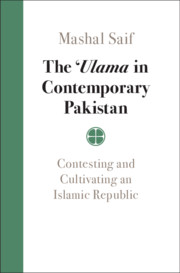Book contents
- The ‘Ulama in Contemporary Pakistan
- The ‘Ulama in Contemporary Pakistan
- Copyright page
- Dedication
- Contents
- Acknowledgments
- Note on Translation and Transliteration
- Introduction
- 1 The Clerics and the Council
- 2 Sovereignty between God and the State
- 3 Questioning State Identity and Legitimacy
- 4 Seeking Security
- 5 Minority Aspirations and the State
- Conclusion
- Bibliography
- Index
1 - The Clerics and the Council
Contesting Religious Authority
Published online by Cambridge University Press: 20 October 2020
- The ‘Ulama in Contemporary Pakistan
- The ‘Ulama in Contemporary Pakistan
- Copyright page
- Dedication
- Contents
- Acknowledgments
- Note on Translation and Transliteration
- Introduction
- 1 The Clerics and the Council
- 2 Sovereignty between God and the State
- 3 Questioning State Identity and Legitimacy
- 4 Seeking Security
- 5 Minority Aspirations and the State
- Conclusion
- Bibliography
- Index
Summary
This chapter challenges the commonly held assumption that the ‘ulama have been displaced by their Islamic nation-states. I demonstrate the clerics’ contemporary relevance by interrogating conjunctures of dispute and rivalry between Pakistani Sunni ‘ulama and their state’s religious arms, particularly the Council of Islamic Ideology (CII). The CII is a constitutional body charged with advising the president, Parliament and Provincial Assemblies on how to Islamize the legislation and the country more broadly. At the chapter’s heart lie recent debates between the CII and the ‘ulama over women’s rights. Through exploring these contestations, I assert that despite challenges from the state’s religious institutions, the ‘ulama retain their religious authority and prestige. I highlight how Pakistani ‘ulama – some with and some without affiliations with the state apparatus – partake in constituting and cultivating the state by pressuring political functionaries to acquiesce to their demands. In concluding, I use the ‘ulama’s discourses and demands to comment on the nature of the Pakistani public sphere and how religious authority operates in that sphere. Finally, by drawing on ‘ulama–state debates on the rights of women, I propose a novel manner of appraising the function of the Council of Islamic Ideology, particularly during 2006–2008.
- Type
- Chapter
- Information
- The 'Ulama in Contemporary PakistanContesting and Cultivating an Islamic Republic, pp. 37 - 75Publisher: Cambridge University PressPrint publication year: 2020

